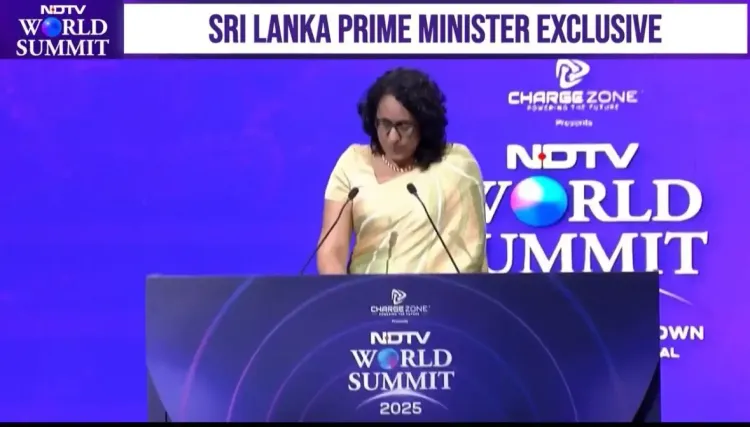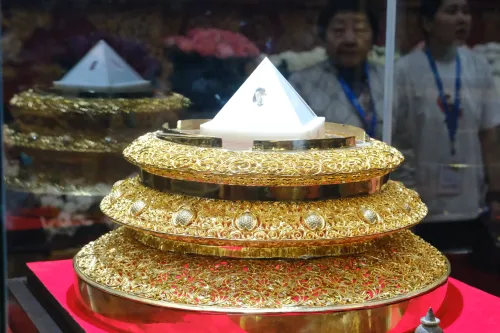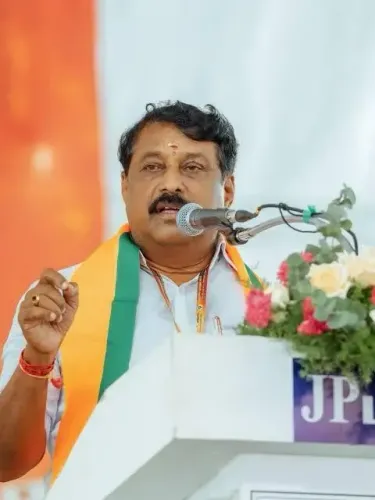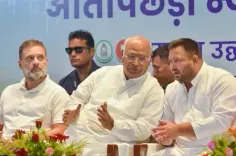How Is Sri Lankan Premier Harini Amarasuriya Celebrating PM Modi’s Leadership at NDTV World Summit 2025?

Synopsis
Key Takeaways
- Amarasuriya highlights India's crucial aid during Sri Lanka's economic crisis.
- Emphasis on regional cooperation for South Asian unity.
- Digitization is key to Sri Lanka's public sector renewal.
- Inflation and debt restructuring are crucial for economic recovery.
- Personal ties strengthen diplomatic relations.
New Delhi, Oct 17 (NationPress) In a heartfelt return to the city where she pursued her studies three decades ago, Sri Lankan Prime Minister Harini Amarasuriya delivered a compelling keynote at the NDTV World Summit 2025, commending Prime Minister Narendra Modi’s “Neighbourhood First” policy as a fundamental element of South Asian unity.
Addressing the audience at the Bharat Mandapam under the summit’s theme, “Edge of the Unknown: Risk, Resolve, Renewal,” her presentation, titled “Steering Change in Uncertain Times,” seamlessly intertwined gratitude for India’s crucial assistance during Sri Lanka’s 2022 economic crisis with a vision for regional revitalization.
Amarasuriya’s remarks, rich in personal reminiscence and diplomatic significance, highlighted the profound connections between Colombo and New Delhi. This visit marked her first official trip to India since taking office in September 2024, where she had met with PM Modi earlier that day at his residence.
Their discussions, which encompassed education, women’s empowerment, innovation, development collaboration, and the welfare of fishermen, reflected the intertwined maritime and cultural heritage shared by the two nations.
“Our discussions covered a broad range of areas, including education, women’s empowerment, innovation, development cooperation and welfare of our fishermen. As close neighbours, our cooperation holds immense potential,” PM Modi posted on X, capturing the warmth of their exchange.
This set a friendly tone for Amarasuriya’s summit appearance, where she, as Sri Lanka’s third female premier after Sirimavo Bandaranaike and Chandrika Kumaratunga, emerged as a voice of intellectual insight and calm determination.
Amarasuriya’s address focused on India’s transformative role during Sri Lanka’s 2022 economic collapse, a crisis characterized by a 7.8 percent GDP contraction, 69.8 percent inflation, and the first sovereign default since 1948.
Triggered by misguided tax reductions, a flawed organic farming initiative, the 2019 Easter bombings, the repercussions of Covid-19, and commodity shocks due to the Ukraine war, Sri Lanka found itself at a humanitarian crossroads.
The United Nations declared a “full-blown emergency,” seeking $47 million in aid. India’s response, under PM Modi’s guidance, was rapid and unparalleled; over $4 billion in aid, including a $500 million currency swap, deferred payments for the Asian Clearing Union, and credit lines for fuel, fertilizer, rice, and medicines. “India redefined leadership during our darkest hour,” Amarasuriya proclaimed.
“I express my deepest appreciation to Prime Minister Modi and the Indian people for standing shoulder-to-shoulder with us, ensuring essentials reached our shores when reserves were perilously low. Your support was a reaffirmation of fraternity, stabilizing our currency and preventing deeper hardship.” This solidarity, she argued, embodies the summit’s theme of risk as a precursor to renewal.
“Risk is the first step towards renewal,” she stated, referencing Sri Lanka’s recovery. Her National People’s Power (NPP) coalition, bolstered by a 2024 electoral landslide where she amassed 655,289 votes, has driven a remarkable turnaround. Inflation has decreased to single digits, GDP grew by 5 percent in 2024, and reserves reached $4.5 billion by mid-year.
Debt restructuring resulted in $3 billion forgiven and $25 billion re-profiled over two decades, with a $3 billion IMF facility enforcing fiscal discipline, aiming for a tax-to-GDP ratio of 15 percent by 2025.
Tourism surged by 66 percent, and remittances increased by 11 percent, reducing public debt from 128 percent to a projected 102.4 percent of GDP by year-end. Amarasuriya, born in Galle in 1970 to a planter father and a homemaker mother, reflected on her journey from Sri Lanka’s tea estates to political leadership.
A distant relative of post-independence minister HW Amarasuriya, she studied at Bishop’s College, Colombo, and spent an exchange year in the US. In 1991, with Sri Lankan universities closed due to civil unrest, she arrived at Delhi’s Hindu College on an Indian scholarship, earning a Sociology degree in 1994.
Later, she attained a Master’s in Applied Anthropology from Macquarie University and a PhD from Edinburgh, focusing on child protection.
Revisiting Hindu College the previous day, she was honored with a guard of honor and toured Classroom 27, where the “Harini Amarasuriya Social & Ethnographic Research Lab” was inaugurated.
“Standing here in Delhi feels like coming a full circle,” she expressed. “In 1991, I navigated flux as a student. Returning now, I witness India’s vibrant transformation – a nation of 1.4 billion, pulsating with diversity and innovation.”
Digitization, she noted, is essential to Sri Lanka’s renewal. “We have restructured our debt and are digitizing public structures,” she said, mentioning e-Government Procurement systems and digital IDs to enhance services.
By 2025, blockchain for land registries and AI-driven analytics will combat corruption in a nation where 24.5 percent live in poverty. “As leaders, we must view risks through the lens of the vulnerable,” she emphasized, highlighting the resilience of Sri Lankans post-COVID.
When asked whether anthropologists or politicians better understand society, she replied, “The purpose of understanding is to transform it. As a politician, I can effect that change.” This blend of academia and activism, honed at the Open University of Sri Lanka and her 2019 political entry, shapes her leadership.
Light-hearted moments showcased her affinity for India: “I love ‘chole bhature’ and Abhimaan was my first Hindi film. I speak ‘thoda thoda’ Hindi – just enough to hum Lata Mangeshkar.”
Her warmth bridged the Palk Strait, enchanting the audience. Amarasuriya’s address, alongside luminaries like Rishi Sunak and Tony Abbott, reaffirmed South Asia’s shift toward renewal.
Her conversations with External Affairs Minister S. Jaishankar, focusing on economic synergy and digital transformation, indicate stronger ties. With India as Sri Lanka’s primary trade partner and tourism source, and Colombo’s apparel investments in India, the partnership flourishes.
As the summit progressed, Amarasuriya’s call for compassionate coalitions, rooted in PM Modi’s leadership, resonated; in risk lies opportunity, and in resolve, a renewed future.









